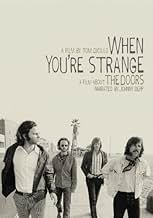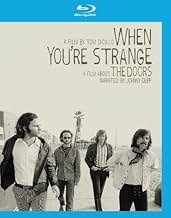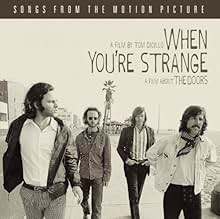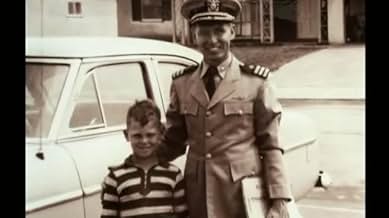VALUTAZIONE IMDb
7,6/10
10.486
LA TUA VALUTAZIONE
Aggiungi una trama nella tua linguaA look at the late '60s and early '70s rock band The Doors, including rare exclusive footage.A look at the late '60s and early '70s rock band The Doors, including rare exclusive footage.A look at the late '60s and early '70s rock band The Doors, including rare exclusive footage.
- Regia
- Sceneggiatura
- Star
- Premi
- 2 vittorie e 1 candidatura in totale
Johnny Depp
- Narrator
- (voce)
John Densmore
- Self
- (filmato d'archivio)
Robby Krieger
- Self
- (filmato d'archivio)
Ray Manzarek
- Self
- (filmato d'archivio)
Jim Morrison
- Self
- (filmato d'archivio)
Pamela Courson
- Self
- (filmato d'archivio)
- (as Pam Courson)
The Doors
- Themselves
- (filmato d'archivio)
Murray Goodman
- Self - Judge
- (filmato d'archivio)
Jimi Hendrix
- Self
- (filmato d'archivio)
Lyndon B. Johnson
- Self
- (filmato d'archivio)
- (as Lyndon Johnson)
George S. Morrison
- Self - Jim's Father
- (as Admiral George S. Morrison)
Paul A. Rothchild
- Self
- (filmato d'archivio)
Adolf Hitler
- Self
- (filmato d'archivio)
- (non citato nei titoli originali)
Janis Joplin
- Self
- (filmato d'archivio)
- (non citato nei titoli originali)
John F. Kennedy
- Self
- (filmato d'archivio)
- (non citato nei titoli originali)
Robert F. Kennedy
- Self
- (filmato d'archivio)
- (non citato nei titoli originali)
Recensioni in evidenza
When You're Strange is made up of all archival footage, clips taken from some famous scenes (i.e. Ed Sullivan Show appearance, intro's at the airport, infamous concert) and not-so-famous ones (clips from the rarely seen films Highway and Feast of Friends are seen here), and it's done in what could be called objectively adulatory. That might not make sense, but what Tom DiCillo wants to show is what the Doors were like, the times they were in, and what was up with their frontman, Jim Morrison, who was with the band for five years before dying one night in a bathtub under mysterious circumstances. At the same time as he's giving us the facts via narration read by Johnny Depp, and with the footage, he wants the audience to see what was so unique about the Doors, their strange appeal as rock figures unlike anyone else at the time; there were other hippie-rock bands, and other poets, and other blues bands, but not quite in this combination.
For the newcomers, the documentary basically tells you everything you need to know, or would care to know, about Jim Morrison and the Doors. I mention his name first because, as a liability with the documentary for fans, it doesn't really go that much into the other members' lives at the time. Perhaps DiCillo saw that not a lot of interest was really there with Ray Manzarek, Robby Krieger and John Densmore (comparatively to Jim, the documentary might tell us, they were very much normal, save for trading off from acid to meditation), or that Morrison is such a dynamic figure- an icon to some, just another wasted rocker to others- that he'd have to take up the screen time. A similar issue could be taken with Oliver Stone's bio-pic - on the other hand, as the film makes pretty clear, after Morrison died, the Doors were practically bust (the doc fails to mention that the band actually *did* go on to make a couple of albums in the 70's, both huge flops, and cynically tour a few years ago as "The 21st Century Doors", but I digress).
An issue can be taken with nothing too new being given to us historically about the band, and (more-so) that DiCillo frames it into the history we've seen so often: tumultuous times, upheaval of society, Johnson and Nixon's Vietnam and domestic policies, Kennedy and MLK assassinations and Charles Manson and Kent etc etc. But what works best is when we can focus on the band as a whole, what made them different, how they somehow gelled together as equal parts blues, poetry, psychedelia, jazz, rock, whatever, in how they approached the songs (no bass player for one thing) and how they recorded tracks. One of the more fascinating aspects is hearing how long the creative process took; their best albums took mere days to record (self-titled debut and LA Woman) while a mixed-bag of pop-tunes like The Soft Parade took nearly a year.
And in the middle, like a vortex of leather and hair and strikingly handsome (or as some might say "Hawt") lead figure, Jim Morrison takes up a lot of the airtime. He's an intriguing, baffling figure, how a man with such talent and natural charisma, as a singer and a writer, felt insecure about himself and also became "Jimbo" as Manzarek called him, a wild alter-ego on stage that made a split between those who wanted the Doors, and those that wanted to spectacle of "JIM". He doesn't come off too well as a person ultimately, as a philanderer and alcoholic and sometimes just cruel person... but at the end of it all, his creative output with the Doors in a few years amounted to more than some rock bands can get in decades of work. Again, this is nothing too new to realize, and some of the big facts are so well covered as to be like pop-legend. But DiCillo does a thorough job putting it altogether, and, substantively (if not as a visionary experience) it trumps Stone's film.
For the newcomers, the documentary basically tells you everything you need to know, or would care to know, about Jim Morrison and the Doors. I mention his name first because, as a liability with the documentary for fans, it doesn't really go that much into the other members' lives at the time. Perhaps DiCillo saw that not a lot of interest was really there with Ray Manzarek, Robby Krieger and John Densmore (comparatively to Jim, the documentary might tell us, they were very much normal, save for trading off from acid to meditation), or that Morrison is such a dynamic figure- an icon to some, just another wasted rocker to others- that he'd have to take up the screen time. A similar issue could be taken with Oliver Stone's bio-pic - on the other hand, as the film makes pretty clear, after Morrison died, the Doors were practically bust (the doc fails to mention that the band actually *did* go on to make a couple of albums in the 70's, both huge flops, and cynically tour a few years ago as "The 21st Century Doors", but I digress).
An issue can be taken with nothing too new being given to us historically about the band, and (more-so) that DiCillo frames it into the history we've seen so often: tumultuous times, upheaval of society, Johnson and Nixon's Vietnam and domestic policies, Kennedy and MLK assassinations and Charles Manson and Kent etc etc. But what works best is when we can focus on the band as a whole, what made them different, how they somehow gelled together as equal parts blues, poetry, psychedelia, jazz, rock, whatever, in how they approached the songs (no bass player for one thing) and how they recorded tracks. One of the more fascinating aspects is hearing how long the creative process took; their best albums took mere days to record (self-titled debut and LA Woman) while a mixed-bag of pop-tunes like The Soft Parade took nearly a year.
And in the middle, like a vortex of leather and hair and strikingly handsome (or as some might say "Hawt") lead figure, Jim Morrison takes up a lot of the airtime. He's an intriguing, baffling figure, how a man with such talent and natural charisma, as a singer and a writer, felt insecure about himself and also became "Jimbo" as Manzarek called him, a wild alter-ego on stage that made a split between those who wanted the Doors, and those that wanted to spectacle of "JIM". He doesn't come off too well as a person ultimately, as a philanderer and alcoholic and sometimes just cruel person... but at the end of it all, his creative output with the Doors in a few years amounted to more than some rock bands can get in decades of work. Again, this is nothing too new to realize, and some of the big facts are so well covered as to be like pop-legend. But DiCillo does a thorough job putting it altogether, and, substantively (if not as a visionary experience) it trumps Stone's film.
After seeing Oliver Stone's version several times over the years, I was, at first, not sure this would interest me. It did very much interest me. I was born in 1960 and I grew up in this era. I had the doors albums, but did not ever see them live. I felt this doc had fresh information; especially rare footage and the bands musical background and how they improvised and contributed to the songs and concerts. If you do not know things about Jim, you do not understand his drives to the dessert and his witnessing things die, and what that death meant to him and how fascinated he was and he wrote about it. For those who say there was not music, you are all out of your minds. There was non-stop music. Really? Would be nice to hear an interview? Frankly, as a psychologist and documentarian, none of the interviews would be very valuable, as the press are morons and ask the most inane questions that infuriate me and the musicians. So instead maybe more of his poetry. But I believe they did the best they could with the footage they had, real footage; which I greatly appreciated. I think if you are curious or a fan, this is a must see.
Well, being a huge fan, knowing quite a lot of people in the Doors (full) circle and having been everywhere from Pere Lachaise to Rothdell Trail to Fairhaven Memorial... I have to say I did turn this on with a slight sense of anxiousness as to whether it would be another destruction of James Douglas Morrison's entire character as both the Oliver Stone horrorshow and the numerous vacuous "rockumentataries" have done.
However, I have to say, I was pleasantly surprised in the main. If you're a hardcore Doors fan then despite the claims of previously unseen footage, you will have seen most of this, few people have been to Paris without bumping into the likes of Rainer Moddeman and other well connected superfans and blagging bootleg stuff and HWY and Feast of Friends have been pretty easy to secure for a long time now as have tapes of Critique etc. But, I was quite impressed with what Tom Dicillo did with the footage, not only was he sympathetic and judicious with it but he accented the narrative with it almost as good as Densmore accented anything Jim did. Clearly, for the eagle eyed, he used footage from other events to underscore a point on an entirely different event but that's just me being picky - ultimately, there is a finite amount of footage that could be trawled. He avoided a lot of the glaring pitfalls one could easily make in such a documentary - for example he didn't get too caught in the trap of juxtaposing events in the 60's with the events of the Doors (there was some of this but it was measured and relevant) and I thought Depp was okay with his voice-over although he was a little dour and the script was at times a little prescriptive and compartmentalised. I do however appreciate that the film has to be appeal to more than the hardcore afficianados and that a balance has to be struck so I think the film really does work well both for those who only have a loose interest in The Doors (or even those just interested in the era) and those more fanatical about The Doors.
I know that Ray (at least) backed this film vocally which gives it credibility from the get go and I you have to give the guy credit for using only original footage. That said, this probably reduces the "filmmaking" to that of an editor so I don't want to be too gushing but still, give the guy his due, the end product is enjoyable, reasonably balanced, it maintained interest and it definitely had some nice touches in it which as I said derived from clever use of the stock material. It wasn't just the choice of footage; it was the more the way it was deployed and paced.
Maybe if budget (or sensibilities) had allowed, the film could have encompassed some other original footage (or other stock footage even) for those Doors fans who want to learn more about the Doors landmarks - be it shots of Venice beach or Rue Beautreillis but what I am glad of is the fact that they stayed well away from including interviews with the usual crowd like Grace Slick etc. which I think would have corrupted the output.
I'll watch it (and review it) sober again and see whether I feel the same but all in all, to quote the Velvet Menace himself, "pretty good, pretty good, pretty neat, pretty neat".
However, I have to say, I was pleasantly surprised in the main. If you're a hardcore Doors fan then despite the claims of previously unseen footage, you will have seen most of this, few people have been to Paris without bumping into the likes of Rainer Moddeman and other well connected superfans and blagging bootleg stuff and HWY and Feast of Friends have been pretty easy to secure for a long time now as have tapes of Critique etc. But, I was quite impressed with what Tom Dicillo did with the footage, not only was he sympathetic and judicious with it but he accented the narrative with it almost as good as Densmore accented anything Jim did. Clearly, for the eagle eyed, he used footage from other events to underscore a point on an entirely different event but that's just me being picky - ultimately, there is a finite amount of footage that could be trawled. He avoided a lot of the glaring pitfalls one could easily make in such a documentary - for example he didn't get too caught in the trap of juxtaposing events in the 60's with the events of the Doors (there was some of this but it was measured and relevant) and I thought Depp was okay with his voice-over although he was a little dour and the script was at times a little prescriptive and compartmentalised. I do however appreciate that the film has to be appeal to more than the hardcore afficianados and that a balance has to be struck so I think the film really does work well both for those who only have a loose interest in The Doors (or even those just interested in the era) and those more fanatical about The Doors.
I know that Ray (at least) backed this film vocally which gives it credibility from the get go and I you have to give the guy credit for using only original footage. That said, this probably reduces the "filmmaking" to that of an editor so I don't want to be too gushing but still, give the guy his due, the end product is enjoyable, reasonably balanced, it maintained interest and it definitely had some nice touches in it which as I said derived from clever use of the stock material. It wasn't just the choice of footage; it was the more the way it was deployed and paced.
Maybe if budget (or sensibilities) had allowed, the film could have encompassed some other original footage (or other stock footage even) for those Doors fans who want to learn more about the Doors landmarks - be it shots of Venice beach or Rue Beautreillis but what I am glad of is the fact that they stayed well away from including interviews with the usual crowd like Grace Slick etc. which I think would have corrupted the output.
I'll watch it (and review it) sober again and see whether I feel the same but all in all, to quote the Velvet Menace himself, "pretty good, pretty good, pretty neat, pretty neat".
I'm a big fan of The Doors and pretty much knew the story before watching this film. And yet I found Johnny Depp to be a very convincing narrator (usually I find narrators to be quite annoying in documentaries!), and the film was quite fluid and easy to watch. Some really cool footage as well! For anyone who's interested, Oliver Stone's 1992 film The Doors is a good and fairly accurate non-documentary worth watching, if you haven't seen it already.
Having been a fan for over 20 years, I'm fairly jaded when it comes to bios on the Doors. The new footage and DiCillo's narrative structure offer a truly fresh look at the subject matter, since it's the first time I've really felt I've had an insider's view on the band. Morrison is treated like a real human being, stripped of all the legend and bombast. Instead of the pretentious rock star, you get to see Jim the person evolving over time, with all the joy and suffering that he experienced. There's a shot of him exiting the courtroom in Miami with a look of vulnerability that I found shocking, as it's at odds with image of the cool, cocky singer. The history of the band is subtly told though a wash of images and sparse narration which touch all the milestones without feeling like another retread. It definitely deserves another viewing, consider me a confirmed buyer of the DVD.
Lo sapevi?
- QuizFor the first time in the band's history unprecedented access was granted, regarding the previously unseen footage of Jim Morrison.
- BlooperA mock newspaper clipping announces both that Sharon Tate and her friends have been found murdered and that Charles Manson and his "Family" are suspected. Manson and the "Family" were not identified as the Tate killers until December 1969, more than four months after the murders happened.
- Citazioni
Jim Morrison: The music can't help but reflecting things that are happening around you
- ConnessioniEdited from Feast of Friends (1969)
I più visti
Accedi per valutare e creare un elenco di titoli salvati per ottenere consigli personalizzati
- How long is When You're Strange?Powered by Alexa
Dettagli
- Data di uscita
- Paese di origine
- Sito ufficiale
- Lingua
- Celebre anche come
- The Doors. When you're strange
- Vedi altri crediti dell’azienda su IMDbPro
Botteghino
- Lordo Stati Uniti e Canada
- 246.078 USD
- Fine settimana di apertura Stati Uniti e Canada
- 66.833 USD
- 11 apr 2010
- Lordo in tutto il mondo
- 1.194.182 USD
- Tempo di esecuzione1 ora 26 minuti
- Colore
- Mix di suoni
- Proporzioni
- 1.85 : 1
Contribuisci a questa pagina
Suggerisci una modifica o aggiungi i contenuti mancanti

































